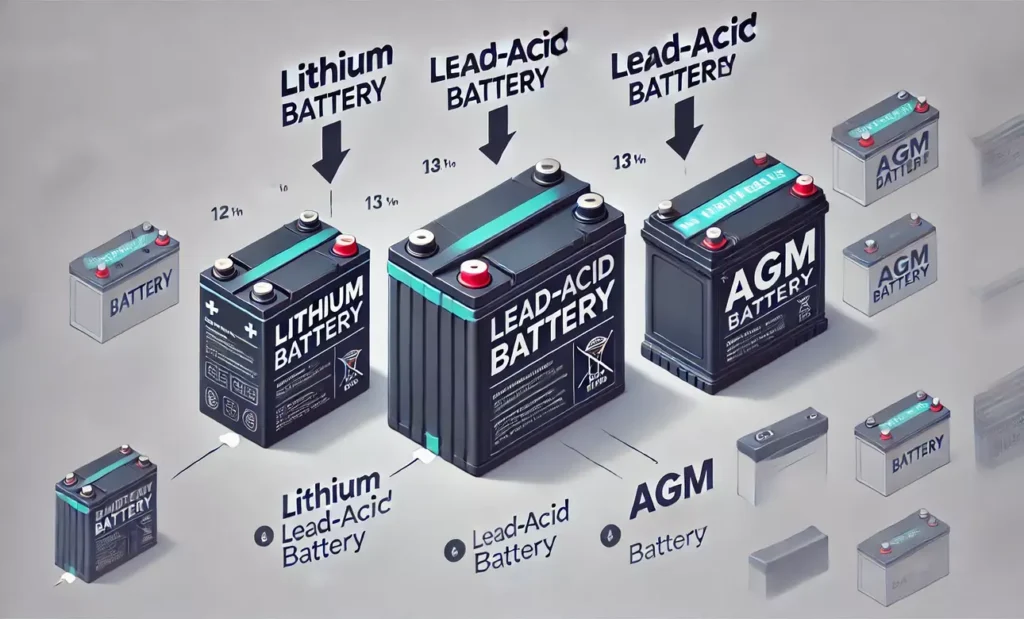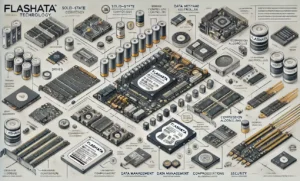How to Get the Best Lithium Marine Batteries

The right battery can make all the difference in running boats. Lithium marine batteries have changed the business by providing a safe and effective way for boats, yachts, and other marine equipment to get power. But what’s special about these batteries? This guide will tell you everything you need to know about best lithium marine batteries, from their main features to how they stack up against other types. This guide will help you understand why lithium batteries are the future of naval power, no matter how much history you have with boats or how new you are to them.
- What Are Lithium Marine Batteries?
- Why Choose Lithium Over Traditional Batteries?
- Key Features of Lithium Marine Batteries
- Applications of Lithium Marine Batteries
- Understanding Battery Capacity and Voltage
- How to Select The Best Lithium Marine Battery
- Top Brands for Best Lithium Marine Batteries
- Installing Lithium Marine Batteries
- How to Take Care of and Maintain Lithium Marine Batteries
- Safety Considerations with Lithium Marine Batteries
- Environmental Impact of Lithium Marine Batteries
- Frequently Asked Questions
- Case Studies: Real-World Use of Lithium Marine Batteries
- The Importance of Lithium in the Future of Marine Energy
- Conclusion
What Are Lithium Marine Batteries?
Advanced power storage devices called lithium marine batteries use lithium-ion technology to provide energy for aquatic uses. They are the most effective method for power storage. Conventional lead-acid batteries have been the norm for many years., but they are different because they are more efficient, last longer, and are lighter. These batteries work especially well in marine environments where room, weight, and power efficiency are vital.
How They Are Different from Other Kinds of Batteries?
There are several main ways that lithium marine batteries are different from other types, such as lead-acid or AGM batteries. They have a greater energy density, allowing them to store more power in a smaller and lighter design. At sea, where room is limited, this makes them perfect for use. Not only that, but lithium cells last longer. They give you more useful energy because they can be discharged more deeply without hurting the battery.
Why Choose Lithium Over Traditional Batteries?
Lithium vs. Lead-Acid Batteries
Lead-acid batteries have been the industry standard for many years. However, lithium batteries have several benefits that make them a better choice for naval use:
- They are so much lighter, making your boat lighter and using less fuel.
- Their cycle life is longer; they can be charged and released more times before they need to be replaced.
- Lithium batteries keep their voltage better and charge faster, so they can reliably power all of your naval needs.
Why Lithium Batteries Are Good for Marine Environments?
Besides being better at what they do, lithium marine batteries are better for the world. They don’t lose their charge as quickly, so they last longer when not in use. This is very important for boats that will be stored for a long time. Further, lithium batteries don’t suffer from sulfation as much as lead-acid batteries do, so they last longer and need fewer repairs.
Key Features of Lithium Marine Batteries
Small and Lightweight Design
One thing that makes lithium boat batteries stand out is how light they are. These old batteries can make your boat heavier, lowering its speed and fuel efficiency. Because lithium batteries are so much lighter, they are great for boats where every pound counts.
High Energy Density
Marine lithium batteries feature impressive energy density, enabling them to pack more power into a smaller, more efficient design. In marine settings, where room is often limited, this is especially helpful. A lithium battery can give you power without taking up much room, whether you need to run your boat’s electronics, lights, or trolling motor.
Long Cycle Life
Lithium batteries are made to last a long time. They last longer and are more stable than lead-acid batteries because they handle more charge and discharge cycles. They will save you money over time since you won’t need to replace them as frequently. After all, they last so long.
The Ability to Charge Quickly
Spending extended periods on the water can be quite time-consuming. Lithium marine batteries charge much less quickly than lead-acid batteries, so you can enjoy your time on the water instead of waiting for your batteries to charge.
Safety Features
It’s important to consider safety when using any power source, and lithium boat batteries are no different. These batteries have many safety features, e.g., overcharge protection, short circuit protection, and temperature management systems, ensuring they can be safely used in any condition.
Applications of Lithium Marine Batteries
Because they are so flexible, lithium marine batteries can be used in many ways on your boat, so you can pick the one that works best for you.
Powering Boats and Yachts
Lithium batteries are the best way to power the main engines of boats and ships. Because they have a high energy density and a long cycle life, they can reliably send power over long distances.
Supporting Marine Electronics
Electronics used in boats, such as GPS systems, fish finders, and radios, need a stable and reliable power source. Lithium batteries give off steady power, so your tools will work without any problems.
Use in Fishing Boats and Other Marine Vessels
For trolling motors to work on fishing boats, they need batteries that can keep putting out power for a long time. Lithium marine batteries can handle the job. They work well for a long time and can be charged quickly so that you can stay on the water longer.
Understanding Battery Capacity and Voltage
Knowing about battery size and voltage is not only important but necessary when picking out a lithium marine battery. With this information, you can make the best choice for your boat.
Why Amp Hours (Ah) Are Important?
The capacity of a battery, which indicates its energy storage capability, is measured in amp-hours (Ah). If the Ah number is higher, the battery can power your electronics longer before it needs to be charged again. Based on how much power you need, you should pick a battery with a high enough Ah number to keep your boat running smoothly.
Voltage Considerations for Marine Use
Another important thing to consider is the voltage. Most boats’ batteries come in 12V, 24V, and 48V versions. The voltage you need will depend on your boat’s power needs. Systems with higher voltage may work better and power bigger ships or more difficult tasks.
How to Select The Best Lithium Marine Battery
To choose the right lithium marine battery, you need to think about a few important things.
Figuring Out How Much Power Is Needed
First, determine the power your boat needs. Consider the engines, electronics, and devices that you’ll be powering. This will help you determine the power (Ah) and volume you need.
Considerations for Size and Weight
Lithium batteries tend to be smaller and lighter compared to other types. Still, you should consider their size and weight, especially if your boat has limited space.
Evaluating Battery Brands
Not all lithium marine batteries are created equal. It’s important to pick a name known for reliability and high quality. Before choosing, look into customer reviews, product warranties, and the brand’s image.
Value vs. Cost
Lithium batteries are usually more expensive initially, but they are usually a better deal in the long run because they last longer and work better. When evaluating the price, take into account the savings you’ll achieve over time.
Top Brands for Best Lithium Marine Batteries
A few names stand out because of how well they work and how reliable they are.
Battle Born Batteries
Battle Born Batteries’ LiFePO4 batteries are recognized for their high quality and can endure as much as ten times longer than typical lead-acid batteries. They have a variety of batteries that can be used in several seafaring situations.
Dakota Lithium
Dakota Lithium is another name that makes lithium batteries light, strong, and long-lasting. The way they make their goods makes them work well in harsh marine environments.
Modern Amperex Technology Co., Limited, or CATL
The biggest maker of lithium-ion batteries in the world is known for its high energy density and high-tech battery control systems.
Renogy
Renogy is famous for its solar goods and makes great lithium marine batteries. Their batteries are made to work with solar power systems, which makes them a great choice for boaters who care about the environment.
Victron Energy
Victron Energy is a leader in the power storage business and offers a wide selection of lithium batteries and related items. Customers know that Victron Energy’s goods will work well and be reliable.
The Relion Battery
Advanced lithium iron phosphate batteries made by Relion Battery are great for use in boats. They have a lot of choices based on your energy needs, and their batteries are known for being safe and working well.
Here’s a table summarizing the details of some top brands of lithium marine battery.
| Brand | Key Features | Capacity | Cycles | Warranty |
|---|---|---|---|---|
| BattleBorn | Water-resistant, sealed design, high-quality BMS | 100Ah | 5,000 | 10 years |
| Renogy | Efficient BMS, quick charging, IP54 protection | 100Ah | 4,000 | 7 years |
| LOSSIGY | Excellent durability, low weight, IP65 rated | 100Ah | 7,000 | 10 years |
| Ampere Time | High storage capacity, strong power output, IP65 rated | 300Ah | 4,000+ | 10 years |
| ExpertPower | High storage capacity, low self-discharge rate | 200Ah | Not specified | Not specified |
| RELiON | Cold weather performance, internal heating system | 100Ah | Not specified | Not specified |
| Dakota Lithium | Extreme temperature tolerance, active BMS protection | 200Ah | 3,000 | 11 years |
| Lithium Pro | Lightweight, Bluetooth connectivity, QuickView app | Group 31 size | 3,000+ | Not specified |
| Optima Blue Top | Compact, vibration-resistant, various sizes | Varies | Not specified | Not specified |
| LiTime | IP65 protection, high/low temperature cut-offs | 230Ah | 4,000 | 5 years |
| Enduro Power | Compact size, terminal fasteners, temperature protection | 200Ah | 4,000 | 5 years |
| VoltX | LCD display, built-in protective system | 200Ah | 4,000 | Up to 5 years |
Installing Lithium Marine Batteries
The most effective way to guarantee that your lithium marine battery functions properly and safely is to install it correctly.
Step-by-Step Installation Guide
Read the Manual: Always start by reading the product directions.
Prepare the Battery Compartment: Make sure the compartment is clean, dry, and has airflow.
Protect the Battery: Use the right mounting tools to protect the battery.
Connect the Terminals: When you connect the terminals, ensure you do it correctly: positive goes first, then negative.
Check the Connections: To keep the wires from coming free, make sure all of the connections are tight and secure.
Safety Measures to Take During Installation
When handling your battery, it is advisable to wear safety gear, such as gloves and safety glasses. Be careful not to short-circuit the wires when you touch them, and never connect or disconnect the battery when it is loaded.
Common Mistakes to Avoid When Installing
Some common errors are:
- Incorrect wiring
- Not Securing the battery properly
- Failing to check for adequate ventilation
Please don’t make these mistakes with your battery to keep it safe and working well.
How to Take Care of and Maintain Lithium Marine Batteries
Your lithium boat battery will last longer and work better if you care for it properly.
Tips for Regular Maintenance
Ensure that the battery connections are clean and free from rust. Check the battery’s charge level often and charge it when it’s low. Do not let the battery get too hot or too cold, as this can affect its performance.
How to Make Batteries Last Longer
To make the battery last longer, don’t let it go completely dead, and fully charge it after every use. Keep the battery in a cool, dry area when it’s not in use. Also, keep it from sitting empty for long amounts of time.
Storing Batteries When Not in Use
If you won’t be using your battery for a while, leave it about half charged and in a cool, dry place. Disconnect the connections and remove the battery from the boat to stop any parasitic drain.
Safety Considerations with Lithium Marine Batteries
Safety is the most important thing when you use lithium batteries on your boat.
Protection against overcharge and over-discharge
Most lithium batteries have safety features that prevent them from being overcharged or excessively discharged. These features help prevent the battery from being damaged and ensure its safe operation.
Instructions for Handling and Transport
Do not drop or expose lithium batteries to rough impacts or drop them while handling or moving them. To prevent damage to the battery, transport it in appropriate containers and secure it properly.
Dealing with Battery Failures
If the battery fails, which is very unlikely, disconnect it immediately and ask the maker what to do next. Avoid attempting to repair a lithium battery on your own.
Environmental Impact of Lithium Marine Batteries
Lithium marine batteries are better for the world in several ways than regular batteries.
Eco-Friendly Benefits of Lithium Batteries
Lithium batteries are more energy-efficient and have a longer lifespan than lead-acid batteries, reducing waste and the environmental impact of battery production. They also have a lower self-discharge rate, meaning less energy is wasted when the battery is not in use.
Proper Disposal and Recycling
Lithium batteries must be discarded responsibly to minimize environmental damage. To ensure that your old batteries are disposed of safely and properly, you should only recycle them at designated recycling sites.
Frequently Asked Questions
How long do lithium marine batteries last?
Lithium marine batteries typically have a lifespan of 5 to 10 years, depending on usage and maintenance.
Can I exchange my lead-acid battery for a lithium battery?
Yes, but you might need to change how your boat charges batteries because lithium batteries must be charged differently.
Are lithium marine batteries safe?
Lithium marine batteries are safe to use and have integrated safety features that ensure their reliability and ease of maintenance.
Do lithium batteries need certain chargers?
Lithium batteries need chargers that work with their special charging profiles to work at their best.
How do I find out what size lithium battery I need?
Add up all the devices on your boat that use power to determine how much power you need, then choose a battery with the right amount of power.
The weather is cold. Can lithium batteries still be used?
Yes, but it may perform better in extremely cold conditions. Some lithium batteries have heating parts built in to make them work better in cold weather.
How quickly do lithium batteries get power back?
Lithium batteries usually fully charge in just a few hours, which is much faster than lead-acid batteries.
How long is the guarantee on lithium marine batteries?
Companies offer different warranties, but most last between 5 and 10 years.
Can I put in a lithium battery by myself?
If you know what you’re doing and take safety steps, you can install a lithium battery. However, it’s advisable to have a professional handle the installation for complex systems.
What makes lithium batteries superior to AGM batteries?
AGM batteries are heavier, have a shorter lifespan, and store less power compared to lithium batteries.
Case Studies: Real-World Use of Lithium Marine Batteries
Examples from Professionals and Boating Fans
Many boaters, both amateurs and pros, have switched to lithium batteries and said they work better and last longer. For example, one yacht owner noted that switching to lithium batteries cut the weight of their gadgets by 50% and made them last longer.
Success Stories from the Marine Business
Several marine companies have switched boats to lithium batteries because they are easier to maintain and use less fuel. These case studies show the real benefits of switching to lithium.
The Importance of Lithium in the Future of Marine Energy
Emerging Trends in Battery Technology
As technology improves, we expect lithium batteries to get even better, with more energy, faster charging times, and more safety features. One area to watch is the progress made in solid-state batteries, which can hold more power and are more stable.
The Significance of Lithium for the Future of Marine Energy Solutions
Batteries made of lithium are going to be very important for naval power in the future. Lithium technology will be at the center as the marine travel industry moves toward more environmentally friendly and cost-effective energy sources. This will drive innovation and shape the future of marine travel.
Conclusion
Lithium marine batteries have many advantages, such as being light, having a long run life, charging quickly, and working reliably. Getting a lithium marine battery is a good idea whether you want to improve your boat’s power system or make it run more efficiently. These batteries will continue to set the bar for marine power as technology improves, making them an important part of any modern boat.






